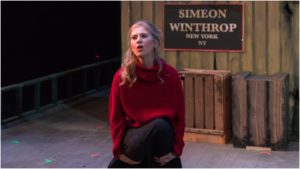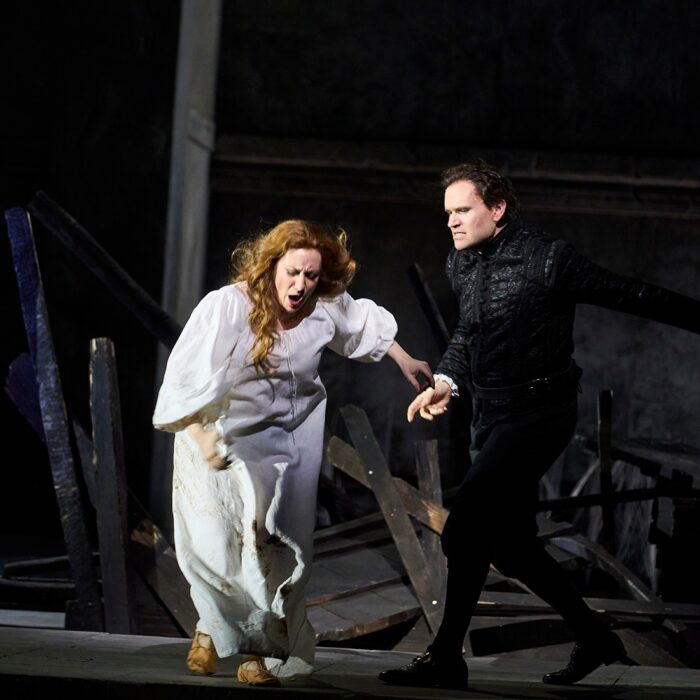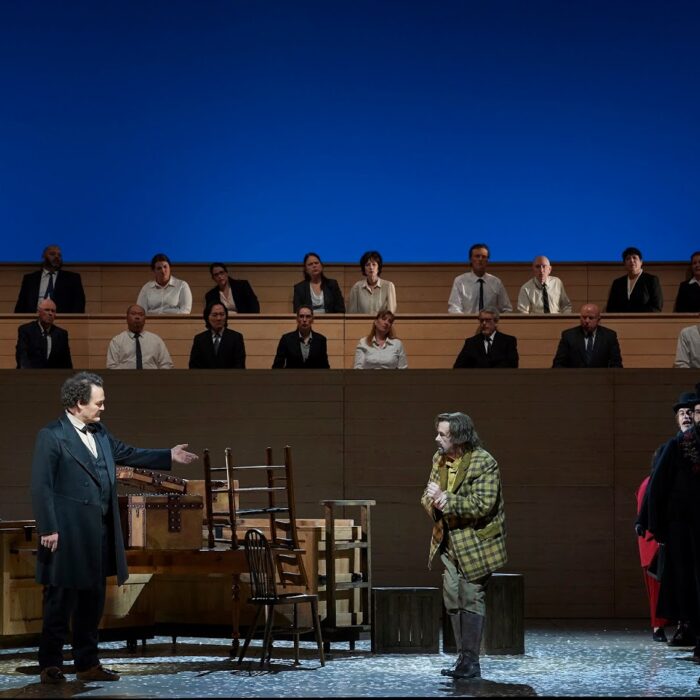
Masteroff & Thomas’ ‘Anna Christie,’ An Opera 18 Years In the Making
By Jennifer PyronEncompass New Opera Theatre’s 2018-2019 season began with the world premiere of “Anna Christie,” with music by Edward Thomas and libretto by the late Joe Masteroff. Artistic Director Nancy Rhodes hosted opening night on Oct. 9, 2018, at Baruch Performing Arts Center to celebrate the debut and honor of Thomas and Masteroff.
Masteroff, who died Sept. 28 made a lasting impression through his years of work in the arts.
“We dedicate our performances to Joseph who attended our workshop of ‘Anna Christie’ in 2017 and during the audience talk-back gleefully announced that he had turned 98! His enthusiasm was contagious that day, and we were all caught up with his zest for telling great stories and creating insightful characters,” Rhodes noted.
Thomas, who recently celebrated his 94th birthday, was in the audience on opening night. He encouraged everyone to visit with him and reflect on the profound commitment it required to create “Anna Christie.”
Over the course of 18 years, the new opera went through countless stages of development before completion while proving to be a labor of love.
The Creative Process
After the premiere, OperaWire had the opportunity to speak with Thomas about the creative process. He said working with Masteroff was a remarkable journey of friendship and a testament to the fulfillment of a dream.
Bringing to life Eugene O’Neill’s Pulitzer Prize-winning play “Anna Christie” in the 21st century as a new opera required special attention from the creators. Masteroff was the initiator for the project and had already begun to explore the work of O’Neill. In fact, the majority of the 18 years it took to develop was spent reworking the music to fit new versions of the libretto. It also was important to polish certain areas of text, which prolonged development.
When asked why he kept rewriting the opera, Thomas said the amount of work they had spent on the project starting in 2000 was reason enough – he was emotionally invested. Thomas and Masteroff were driven by the sheer hard work it takes to create something, based on a story from the 1900s.
Even more inspiring is the fact that “Anna Christie” highlights a piece of history that resonates today, as we see first-hand in reports about political abuse of power, specifically a disturbing number of sexually abusive leaders. The opera opens the doors for listeners to recognize the damaging effects of an abusive and dysfunctional lifestyle, yet provides hope by means of transformation for all involved.
The World Premiere
Anna Christie’s character embodied a complicated story that many could relate to during the story’s era of sailors and prostitutes: seaport life’s darkest moments wedded to the human desire to hope for a better life. Greta Garbo even starred in her first “talking film” as Anna in 1930, and so continued the story’s lifeline. And yet, it was Masteroff and Thomas who decided to resurrect Anna Christie in the 21st century, which may seem far-fetched but proved to be necessary to re-examine history and learn from it.
Melanie Long, as Anna Christie, gave a remarkable performance. Her ability to express her character transported the audience to a time when a woman’s voice went unnoticed and tragic abuses towards women were common. Noticeably moved by the story, Long channeled Anna’s spirit to showcase her talent as a performer: outstanding acting combined with an emotionally connected voice. Thomas told OW that Long was “the perfect Anna.”
Frank Basile, as Chris Christopherson, gave a solid performance as Anna’s unavailable seafaring father. His eyes held an enchanting glow while he sang, creating an emotional tie between the stage and the audience. He was grounded in his character’s dysfunctional tendencies and created a backbone for the opera.
As Christopherson’s companion Marthy, Joy Hermalyn, set the tone for what was to come for Anna if she remained a prostitute. Hermalyn was bold and vivacious, showcasing how humor can be beneficial whatever the life circumstance – a beacon of hope for the downtrodden.
The most shocking turn of events in the opera occurs when the young stoker Mat Burke, played by Jonathan Estabrooks, physically forces himself onto Anna in the first act. After surviving a shipwreck, he had managed to be rescued by Anna’s father, which resulted in a terrifying and hallucinatory interaction with Anna. Just as she is given a second chance in life, she gets lulled back onto the path towards a dark fate: sexual abuse and mental turmoil. However difficult Estabrooks’ role was to appreciate, his performance was strong and on point.


